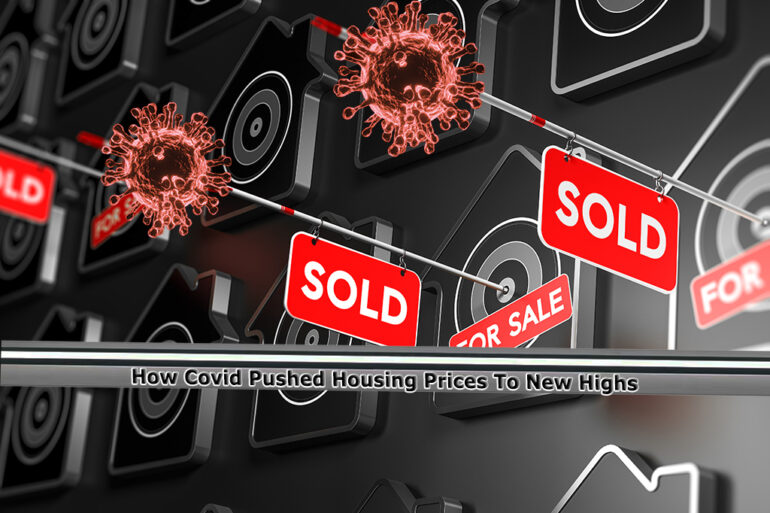How Covid Pushed Housing Prices To New Highs
When it comes to housing, the big picture right now in America is that there just aren’t enough houses on the market to satisfy the number of people who want to buy one!
At the same time, many of us have too much disposable income from not doing anything for basically a whole year and getting a pile of stimulus cash. These two factors have created a blistering white housing market with prices that seem to jump every few days.
Houses Are at Their Highest Prices in History
When COVID-19 hit the United States in 2020, many people started moving from large city areas to suburban locations. One reason is that the pandemic has frightened them away from living in more populated cities, where there are higher chances of homeowners and their families getting infected with COVID-19.
More folks also started working from home last year because of the pandemic’s effect on the workplace. A larger house (when compared to an apartment or condo) gives homeowners more of the space they needed for, say, a lovely new home office.
When hundreds of thousands of U.S. homeowners started wanting to move to rural areas all around the same time in 2020, home prices began to skyrocket as folks across the country furiously bid against each other for a new residence.
This sometimes resulted in the buyer paying way more for a piece of property than they normally would have before the pandemic. In fact, in late May of 2021, CNBC reported that housing prices were over 13% higher when compared to last year. Still, experts at Bloomberg say that the high prices of homes in 2021 and 2022 won’t be as devastating to the economy as back in the mid-2000s.
A Lack of Inventory
People removed their houses from the market when the pandemic hit because they didn’t know how long they would be stuck inside their homes!
Bankrate, a New York–based financial company with the mission of helping ordinary citizens make better financial decisions, reported in the spring of 2021 that the shortage of housing for sale in the U.S. doesn’t look like it will get any better anytime soon — at least not for another 38 to 60 months.
Houses are in such high demand right now that more and more potential homeowners are buying ones that are not even readily available yet. According to the Sun Sentinel Newspaper, the minimum supply of homes has people making their purchase before the community that they are planning to move into has been fully constructed!
The locals in places like Miami-Dade County are reportedly getting pushed out of the home-buying race by businesspeople and others who are just recently arriving to the area. These newcomers are ready and willing to pay the overpriced cost of a new home.
In this area of Florida, the median price for a home has increased by around $100,000 since last year, and there are many single-family homes that are jumping almost 20% in price from month to month in 2021.
A Lack of Builders and Building Materials
Not only has the cost of lumber, HVAC systems, roofing supplies, and other home building necessities increased, but it is harder this year than ever to find homebuilders. According to HBS Dealer, more and more builders are willing to “take a step back from new orders” because of supply and inflation issues.
The publication also points out that the “rising costs of lots” and the availability of land is hindering homebuilders from taking on larger projects.
The pandemic made an already bad problem worse, since the construction of homes had been reportedly slow since the fall of 2019, a few months before COVID-19 even hit the U.S.
In September of that year, the NH Business Review cited findings from a recently conducted Zillow survey that led many real estate specialists and economists to believe that the construction of these much-needed single-family dwellings will dawdle at least “until 2022 or later.”
The Government’s Response to the Housing Shortage
The Biden administration is taking the approach of trying to influence municipal governments to relax their zoning laws and let builders build rental buildings in locations that would normally be reserved for the construction of single-family dwellings.
Those who are against the proposal say that it doesn’t focus on enough roads and bridges. But there is an opportunity within the proposal for local governments to bid for funds to fix those types of structures, as long as the municipality that is receiving the grant money agrees to loosen up its zoning laws.
Still, others feel that Biden’s proposal will actually make housing costs rise. Most importantly, the Biden administration has picked up the baton of handing out stimulus cash to everyone. This stimulus money seems to keep coming every few months.
To many, this extra money just makes it easier to bid up the prices on properties they are in the market for, thus propelling these property bidding wars even higher. This has a heating effect on all the real estate prices around these new sales that would be used as a comp.
Everyone who has managed to keep their income steady through and after the pandemic has received plenty of extra spending cash from the government. This has created its own inflation of sorts — anything perceived as scarce and “biddable” has quickly ran up in value.
We are seeing a meteoric rise in housing not seen in a generation, even outpacing the run up to the Great Recession. Thanks to the stimulus money and supply chain issues, we think the prices will keep going up for the time being.
No one knows where the market values will end up, but when we get to the end of this crazy journey, hopefully the peak prices will be safely inside the clouds. If the bubble pops, we are all in for a very scary ride down that mountain!








